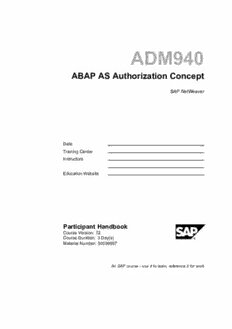Table Of ContentADM940
ABAP AS Authorization Concept
SAP NetWeaver
Date
Training Center
Instructors
Education Website
Participant Handbook
Course Version: 72
Course Duration: 3 Day(s)
Material Number: 50099897
An SAP course - use it to learn, reference it for work
Copyright
Copyright©2011SAPAG.Allrightsreserved.
Nopartofthispublicationmaybereproducedortransmittedinanyformorforanypurpose
withouttheexpresspermissionofSAPAG.Theinformationcontainedhereinmaybechanged
withoutpriornotice.
SomesoftwareproductsmarketedbySAPAGanditsdistributorscontainproprietarysoftware
componentsofothersoftwarevendors.
Trademarks
• Microsoft®,WINDOWS®,NT®,EXCEL®,Word®,PowerPoint®andSQLServer®are
registeredtrademarksofMicrosoftCorporation.
• IBM®,DB2®,OS/2®,DB2/6000®,ParallelSysplex®,MVS/ESA®,RS/6000®,AIX®,
S/390®,AS/400®,OS/390®,andOS/400®areregisteredtrademarksofIBMCorporation.
• ORACLE®isaregisteredtrademarkofORACLECorporation.
• INFORMIX®-OnLineforSAPandINFORMIX®DynamicServerTMareregistered
trademarksofInformixSoftwareIncorporated.
• UNIX®,X/Open®,OSF/1®,andMotif®areregisteredtrademarksoftheOpenGroup.
• Citrix®,theCitrixlogo,ICA®,ProgramNeighborhood®,MetaFrame®,WinFrame®,
VideoFrame®,MultiWin®andotherCitrixproductnamesreferencedhereinaretrademarks
ofCitrixSystems,Inc.
• HTML,DHTML,XML,XHTMLaretrademarksorregisteredtrademarksofW3C®,World
WideWebConsortium,MassachusettsInstituteofTechnology.
• JAVA®isaregisteredtrademarkofSunMicrosystems,Inc.
• JAVASCRIPT®isaregisteredtrademarkofSunMicrosystems,Inc.,usedunderlicensefor
technologyinventedandimplementedbyNetscape.
• SAP,SAPLogo,R/2,RIVA,R/3,SAPArchiveLink,SAPBusinessWorkflow,WebFlow,SAP
EarlyWatch,BAPI,SAPPHIRE,ManagementCockpit,mySAP.comLogoandmySAP.com
aretrademarksorregisteredtrademarksofSAPAGinGermanyandinseveralothercountries
allovertheworld. Allotherproductsmentionedaretrademarksorregisteredtrademarksof
theirrespectivecompanies.
Disclaimer
THESEMATERIALSAREPROVIDEDBYSAPONAN"ASIS"BASIS,ANDSAPEXPRESSLY
DISCLAIMSANYANDALLWARRANTIES,EXPRESSORAPPLIED,INCLUDING
WITHOUTLIMITATIONWARRANTIESOFMERCHANTABILITYANDFITNESSFORA
PARTICULARPURPOSE,WITHRESPECTTOTHESEMATERIALSANDTHESERVICE,
INFORMATION,TEXT,GRAPHICS,LINKS,ORANYOTHERMATERIALSANDPRODUCTS
CONTAINEDHEREIN.INNOEVENTSHALLSAPBELIABLEFORANYDIRECT,
INDIRECT,SPECIAL,INCIDENTAL,CONSEQUENTIAL,ORPUNITIVEDAMAGESOFANY
KINDWHATSOEVER,INCLUDINGWITHOUTLIMITATIONLOSTREVENUESORLOST
PROFITS,WHICHMAYRESULTFROMTHEUSEOFTHESEMATERIALSORINCLUDED
SOFTWARECOMPONENTS.
g201136103757
About This Handbook
Thishandbookisintendedtocomplementtheinstructor-ledpresentationofthis
course,andserveasasourceofreference. Itisnotsuitableforself-study.
Typographic Conventions
American English is the standard used in this handbook. The following
typographic conventions are also used.
Type Style Description
Example text Wordsorcharactersthatappearonthescreen. These
includefieldnames,screentitles,pushbuttonsaswell
asmenunames, paths, andoptions.
Alsousedforcross-referencestootherdocumentation
both internal and external.
Exampletext Emphasized words or phrases in body text, titles of
graphics, and tables
EXAMPLETEXT Names of elements in the system. These include
reportnames,programnames,transactioncodes,table
names, andindividualkeywordsofaprogramming
language,whensurroundedbybodytext,forexample
SELECT and INCLUDE.
Example text Screenoutput. Thisincludesfileanddirectorynames
and their paths, messages, names of variables and
parameters, and passages of the source text of a
program.
Example text Exactuserentry. Thesearewordsandcharactersthat
youenterinthesystemexactlyastheyappearinthe
documentation.
<Example text> Variableuserentry. Pointedbracketsindicatethatyou
replacethesewordsandcharacterswithappropriate
entries.
iii
2011 © 2011 SAP AG. All rights reserved.
AboutThisHandbook ADM940
Icons in Body Text
Thefollowingiconsareusedinthishandbook.
Icon Meaning
Formoreinformation,tips,orbackground
Noteorfurtherexplanationofpreviouspoint
Exception or caution
Procedures
Indicatesthattheitemisdisplayedintheinstructor's
presentation.
iv
© 2011 SAP AG. All rights reserved. 2011
Contents
Course Overview......................................................... vii
Course Goals...........................................................vii
Course Objectives .....................................................vii
Unit 1: Authorizations in General......................................1
What Are Authorizations?..............................................2
Creating and Implementing an Authorization Concept........... 11
Unit 2: Basic Terminology of Authorizations...................... 41
Elements and Terminology of the Authorization Concept
(ABAP)..............................................................42
Authorization Checks in the SAP System .........................63
Unit 3: User Settings.................................................... 75
Maintaining and Evaluating User Data.............................76
Unit 4: Working with the Role Maintenance ......................105
Role Maintenance and Standard Roles...........................107
Special ABAP Roles.................................................144
Subtleties of Authorization Maintenance..........................172
Unit 5: Basic Settings..................................................189
Role Maintenance: Installation and Upgrade ....................191
Access Control and User Administration..........................214
Troubleshooting and Administration Aids.........................251
Unit 6: Transporting Authorizations................................271
Transporting Authorization Components..........................272
Unit 7: Integration into the Company Landscape ...............287
Central User Administration (CUA)................................289
Integration into Organizational Management ....................307
SAP NetWeaver Identity Management............................327
Appendix 1: SAP Notes About Authorizations ................343
Appendix 2: ...........................................................347
Glossary...................................................................349
v
2011 © 2011 SAP AG. All rights reserved.
Contents ADM940
Index .......................................................................353
vi
© 2011 SAP AG. All rights reserved. 2011
Course Overview
ThiscourseprovidesinformationaboutthefundamentalsoftheSAPauthorization
concept,usingSAPsystemsbasedonASABAP.BasicknowledgeabouttheSAP
environment is vital for this training course.
Target Audience
Thiscourseisintendedforthefollowingaudiences:
• Project team members
• Authorizationanduseradministratorsfromsystemadministration
• Authorizationanduseradministratorsfromtheuserdepartments
Course Prerequisites
Required Knowledge
• SAPTEC(SAPNetWeaver: FundamentalsoftheApplicationPlatform)
Recommended Knowledge
• SAP01 (SAP Overview)
• Attendanceofbasicandadvancedtrainingcoursesinatleastoneapplication
area
Course Goals
This course will prepare you to:
• Outlinetheelements,strategies,andtoolsoftheSAPauthorizationconcept
• GenerateandassignauthorizationprofileswiththeRoleMaintenance
• WorkwiththeCentralUserAdministration(CUA)tool
Course Objectives
Aftercompletingthiscourse, youwillbeableto:
• Listtheelementsandobjectsoftheauthorizationconcept
• ExplaintheuseandpurposeoftheRoleMaintenance
• Analyze authorizations
• Describe special objects for administrators
vii
2011 © 2011 SAP AG. All rights reserved.
CourseOverview ADM940
viii
© 2011 SAP AG. All rights reserved. 2011
Unit 1
Authorizations in General
Unit Overview
Thisunitistheentrypointintothetopicofauthorizations.
Startingwiththebasicconceptsoftheauthorizationstopic, itaddressesSAP's
role-basedauthorizationconcept,anddiscussesamethodthatdescribeshowto
create and structure authorizations, and how to implement them in a customer
landscape.
Unit Objectives
After completing this unit, you will be able to:
• DescribetheSAPauthorizationconceptaspartofacomprehensivesecurity
concept
• Explain the access control mechanisms
• Explainhowusers,roles,andauthorizationsarerelated
• Describethetechnicalimplementationofarole-basedauthorizationconcept
• Explainthestructureofanauthorizationconcept
• Listthestepsrequiredtoimplementaconcept
• Describetheactivitiesfortheindividualimplementationsteps
• Use the presented procedure model for implementing an authorization
concept for your own projects
• Explainthestrategyforuserandauthorizationadministration
Unit Contents
Lesson: What Are Authorizations? ..............................................2
Lesson: Creating and Implementing an Authorization Concept ........... 11
Exercise 1: Creating and Implementing an Authorization Concept...29
1
2011 © 2011 SAP AG. All rights reserved.
Unit1: AuthorizationsinGeneral ADM940
Lesson: What Are Authorizations?
Lesson Overview
ThislessonwillintroducethecontentsoftheADM940course. Itwillalsoprovide
an introduction to the topic of authorizations and the role-based authorization
concept, using a number of overview figures.
Lesson Objectives
Aftercompletingthislesson, youwillbeableto:
• DescribetheSAPauthorizationconceptaspartofacomprehensivesecurity
concept
• Explain the access control mechanisms
• Explainhowusers,roles,andauthorizationsarerelated
• Describethetechnicalimplementationofarole-basedauthorizationconcept
Business Example
Authorizationsareusedtocontrolaccessattheapplicationlevel. Atthislevel,the
termroleisatthecenteroftheSAPauthorizationconcept. SAPcourseADM940
describestheindividualsteps,fromsetup,throughtheimplementationofarole
conceptwithPFCG,toitsuseinaproductionenvironment. Thesystemmustalso
beprotectedattheoperatingsystem,database,network,andfrontendlevelsin
ordertoimplementacomprehensivesecurityconcept. SAPcoursesADM950and
ADM960, for example, consider these issues.
Content Overview for SAP Course ADM940 and
Positioning in the SAP Customer Curriculum
Figure 1: Curriculum - Overview
2
© 2011 SAP AG. All rights reserved. 2011

